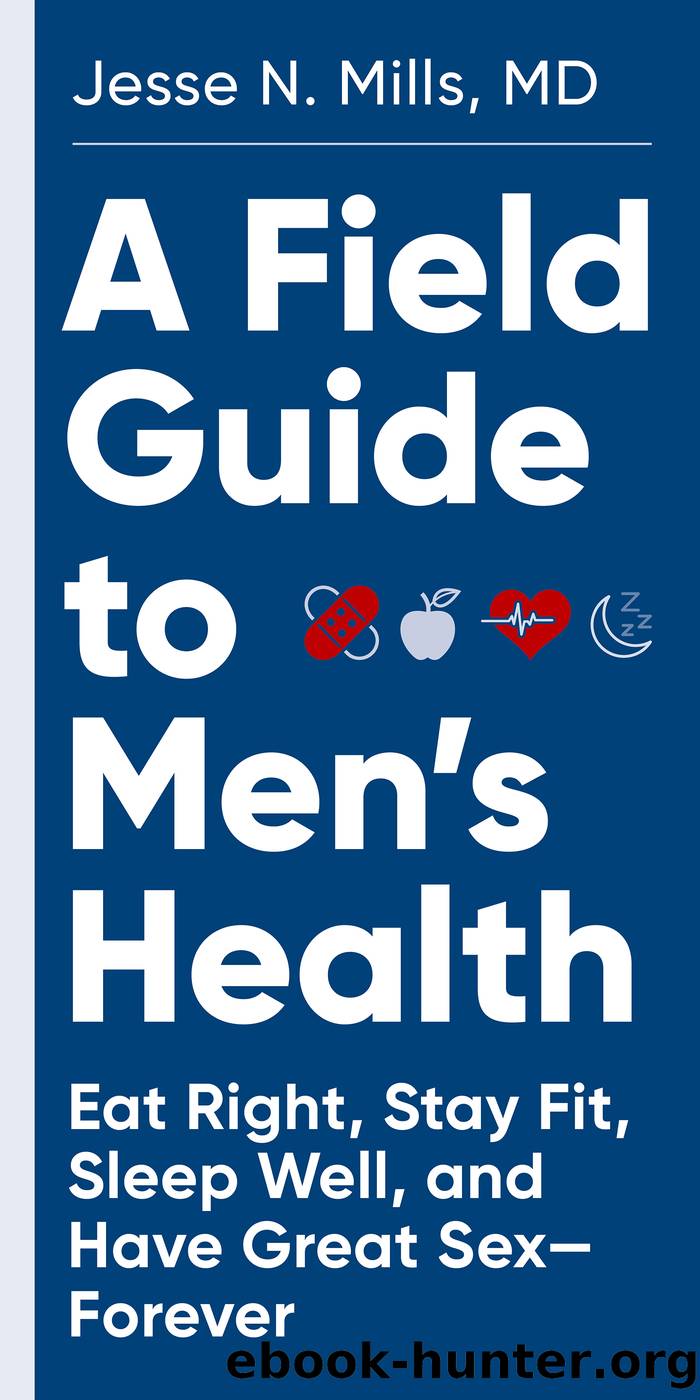A Field Guide to Men's Health by Mills Jesse;

Author:Mills, Jesse;
Language: eng
Format: epub
Publisher: Artisan
Published: 2021-10-28T19:25:32+00:00
Fitness by the Decades
Will the workout you do in your 20s still work in your 50s? While the principles remain the same no matter what age you are, what I might recommend to a 20-year-old patient is certainly different from what I recommend to an 80-year-old. It can be empowering to understand how age may influence your exercise routine. No matter how many years you have under your belt, your best strategy is to always fall back to the basics: eat less than you did yesterday, move more than you did yesterday, and sleep better than you did yesterday.
20s
This is the decade to pack on muscle and prime your heart. Heart cholesterol plaques start forming in adolescence, which lead to heart disease later in life. If you get your heart rate up to 80 percent of your target maxâfor a 20-year-old, thatâs in the 160sâfor at least 30 minutes a day, you will set yourself up for a great adulthood. Testosterone levels start declining after age 25, and vigorous exercise in your 20s will maintain your T levels as you get older. One of the first signs of molecular aging, loss of high nitric oxide levels, starts between ages 25 and 28. As poet Dylan Thomas admonished, rage against the dying of the light!
30s
Letâs hope youâve established a great foundation in your 20s because, most likely, youâll be professionally and personally busier in your 30s. If you donât have a great foundation, welcome! The good news is, it only takes a few months to build that new foundation of better nutrition, higher level of exercise, and better sleep habits. This will prepare you for taking on the joy and stressors of life in your 30sâyou may be married, starting a family, and accelerating your career. These things are awesome, but they are demanding and stressful. Youâll want to use exercise as an escape and stress reliever even as you maintain strong testosterone levels, bone density, and heart health. Couples workouts are a great way to bond with your partnerâstudies show that couples who exercise together are happier, more sexual, and more grounded. Working out single may open you up to meeting someone on a trail, in a gym, or pursuing like-minded fitness activities.
40s
This is where many men start to feel their age. Our joints and muscles do take longer to recover, we get stiffer, and we are more prone to injury. If youâre starting an exercise program in your 40s, take it slow. Instead of exercising hard five to seven days a week, maybe start at three to five days a week and work your way up. This gives your joints a chance to catch up to your eager brain and willing muscles. Donât make excuses for your age; embrace your wisdom, and the first time you pass a younger guy on the trail, take pride.
50s
Exercise prevents cancer. If for no other reason, stay fit in this decade so you can be there for your grandkids. Listen to your body, but donât be afraid to push yourself a little past your comfort zone.
Download
This site does not store any files on its server. We only index and link to content provided by other sites. Please contact the content providers to delete copyright contents if any and email us, we'll remove relevant links or contents immediately.
Spare by Prince Harry The Duke of Sussex(4195)
Machine Learning at Scale with H2O by Gregory Keys | David Whiting(2287)
Fairy Tale by Stephen King(2064)
Will by Will Smith(2040)
Hooked: A Dark, Contemporary Romance (Never After Series) by Emily McIntire(1954)
Rationality by Steven Pinker(1764)
The Bullet Journal Method by Ryder Carroll(1500)
The Becoming by Nora Roberts(1330)
Friends, Lovers, and the Big Terrible Thing by Matthew Perry(1327)
A Short History of War by Jeremy Black(1299)
HBR's 10 Must Reads 2022 by Harvard Business Review(1255)
The Strength In Our Scars by Bianca Sparacino(1242)
Can't Hurt Me: Master Your Mind and Defy the Odds - Clean Edition by David Goggins(1227)
515945210 by Unknown(1207)
Fear No Evil by James Patterson(1107)
Love on the Brain by Ali Hazelwood(1095)
Bewilderment by Richard Powers(1083)
This Family Does It by Kevin Sellers(1080)
443319537 by Unknown(1071)
